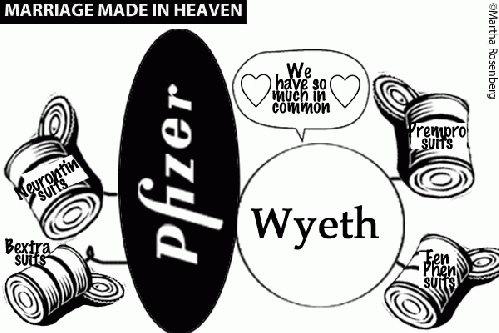You would think the drug company that made the best-selling drug in the world--Lipitor--and the blockbuster Viagra would appreciate the country and patients who have been so good to it. You'd be wrong. This month Pfizer announced a proposed merger with Dublin-based Allergan, the maker of the $2-billion-plus-a-year drug Botox--a deal valued at $160 billion--to dodge US taxes. The deal, expected to go through because it circumvents the new Treasury proposals to stop such tax dodges, has been condemned from both sides of the aisle--Hillary Clinton and Donald Trump.
It's only been a year since the Treasury Department drafted new proposals to stop Big Pharma from enacting brazen tax evasion or "tax inversions"-- reincorporating in countries like Britain, Ireland, or the Netherlands to duck US taxes, often merging with a European entity.
Before the new Treasury Department proposals, Illinois-based AbbVie sought to merge with ADHD drug-maker Shire, based on a small island in the English Channel, in a deal that would have made it bigger than Boeing or McDonald's. Illinois-based Walgreen, the US's largest pharmacy chain, also sought a tax inversion but changed its mind when customers and lawmakers called the maneuver unpatriotic and unfair to corporations remaining in the US. And Pfizer tried to dodge taxes last year by merging with British drug company AstraZeneca, who declined. Still, scandal-ridden device-maker Medtronic has succeeded in such a tax inversion, moving its headquarters to Ireland by acquiring Dublin-based Covidien PLC and reducing the tax it pays on profits earned overseas from 35 to 5 percent. Nice tax rate if you can get it.
Meanwhile, Pfizer has kept $74 billion overseas to dodge taxes, says the New York Times, and calls taxes "it never even paid" too high.
Repeat Offender
To say Pfizer has been accused of wrongdoing in the past is like saying BP had an oil spill. Even as Pfizer was under a 5-year Corporate-Integrity Agreement (CIA) with HHS for withholding $20 million in Lipitor rebates owed to Medicaid in 2002, it was marketing Neurontin for off-label indications, which earned it a second CIA in 2004. And even as it entered into the second CIA, it was marketing Lyrica and other meds for off-label indications, which earned it a third CIA! Does anyone notice that CIAs are... not a deterrent?
When it comes to corruption and scandals, Pfizer seems to court trouble. It bought Warner-Lambert in 2000 knowing the company's marketing practices were under criminal investigation and its Rezulin had been withdrawn. Then it bought hormone-maker Wyeth knowing it had a thicket of Fen-Phen heart-valve suits and Prempro cancer suits. Pfizer admits spying on medical students who were protesting against Big Pharma's influence in medical education!
During one week in June of 2010, Pfizer
(Note: You can view every article as one long page if you sign up as an Advocate Member, or higher).






